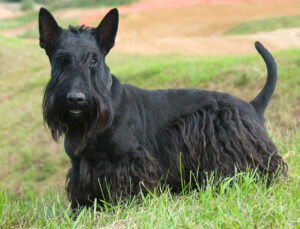The Scottish Terrier, also known as the Scottie, is a proud and independent breed of dog known for its feisty and determined personality. With their distinctive beards and shaggy eyebrows, Scotties have been a popular breed for centuries, admired for their courage and loyalty. This article will delve into the Scottish Terrier temperament and explore what makes them such unique and beloved pets.
Scottish Terriers, also known as Scotties, are a small breed of dog known for their courage, determination, and independent streak. They are also playful, affectionate with their owners, and can be good with children.
However, they can be aloof with strangers and may exhibit territorial behavior, making them best suited to homes where they are the only pet. Scotties are also prone to barking and may require early socialization and training to develop good habits.
Scottish Terriers are confident, energetic, and highly intelligent dogs. Initially, they were bred to hunt small game and vermin, but they still retain a strong prey drive. This can lead to challenges with other small animals, such as cats unless they are socialized with them from a young age.
Also, Scotties are known for their independent nature and may be stubborn, making training and obedience work challenging for inexperienced owners. However, with consistent, positive reinforcement training, Scotties can excel in obedience, agility, and other dog sports.
Scottish Terrier temperament

Scottish Terriers are known for their confident, independent, and sometimes stubborn personalities. They are also playful, affectionate, and loyal to their owners. These dogs are highly intelligent and can be trained well with positive reinforcement techniques.
However, they can be aggressive towards other animals, especially small pets, if they are appropriately socialized from a young age. They make excellent watchdogs but can bark excessively if left alone for extended periods.
The Scottish Terrier, also known as the Scottie, originated in Scotland as a small and sturdy breed. They have a distinctive appearance: their short legs and thick, wiry coats. Scotties are known for their tenacity and are often referred to as “Diehard” dogs due to their courage and determination.
Despite their small size, they have prominent personalities and are not afraid to stand up for themselves. They can be independent and may not always respond to commands, but they are also highly affectionate with their owners and make great family pets.
Scottish Terrier owners must provide plenty of exercises, mental stimulation, and training to keep their dogs happy and healthy. They are not suited for apartment living and do best in a home with a securely fenced yard where they can play and run. With proper care, training, and attention, Scottish Terriers can be excellent companions for those who appreciate their unique and bold personalities.
Is the Scottish Terrier good with children?
Scottish Terriers can get along well with children, but their interactions can vary based on the individual dog and child. They are generally playful and affectionate with their family members, including children. Still, their small size and tendency to be independent and sometimes stubborn can make them less tolerant of rough handling.
Children must be taught how to interact with dogs respectfully and gently to ensure safe and positive interactions. Also, supervision is recommended when the Scottish Terrier and children are together to prevent accidents or misunderstandings.
In general, the Scottish Terrier is a good choice for families with older, well-behaved children who have been taught how to interact with dogs appropriately.
Are Scottish Terriers easy to train?

Scottish Terriers can be challenging to train, but they can be trained to a certain degree with patience and consistency. They are highly intelligent dogs capable of learning but can also be independent and stubborn sometimes. This breed is less eager to please its owners than some other breeds and may require a more firm hand in training.
Positive reinforcement training methods are recommended for Scottish Terriers. Consistency, patience, and plenty of treats and praise can motivate and encourage them during training sessions. However, it’s essential to set clear boundaries and establish a strong leadership role to prevent the dog from becoming too dominant.
Training sessions should be kept short and engaging to prevent boredom, and it’s important to start training early and continue to reinforce commands throughout the dog’s life. With the right approach, Scottish Terriers can learn basic obedience commands, but owners should be prepared for a challenge.
Are Scottish Terriers good with other pets?
Scottish Terriers can be aggressive toward other animals, especially small pets like cats and rodents if they are not appropriately socialized from a young age. They have a strong prey drive and may see other small animals as prey, which can lead to severe problems.
Early socialization with other animals is crucial to prevent aggressive behavior in Scottish Terriers. Exposing them to various animals, people, and environments when they are young can help them learn to tolerate and get along with other pets.
If you already have other pets in your home, it’s important to supervise interactions between them and the Scottish Terrier until you’re confident that they can get along safely. With patience, consistency, and proper socialization, Scottish Terriers can learn to coexist with other pets, but it is not guaranteed and may depend on the individual dog.
Is the Scottish Terrier a good apartment dog?

The Scottish Terrier could be better suited for apartment living. They are an active and energetic breed requiring plenty of exercises and mental stimulation. Scottish Terriers are known for their strong prey drive and need a secure and fenced yard where they can play and run. They also tend to bark excessively, which can be a problem in apartment living situations.
This breed does best in a home with a securely fenced yard where they can expend their energy and play. They also do well in homes with active owners who can provide plenty of exercise and mental stimulation. Scottish Terriers are loyal and affectionate with their owners, but they could be better for apartment living due to their energetic and sometimes vocal nature.
Are Scottish Terriers good watchdogs?
Scottish Terriers are known for their bold and fearless nature, which makes them good watchdogs. They have a strong protective instinct and bark to alert their owners of potential threats. However, they are not known for being aggressive and may not be suitable as guard dogs.
More so, Scottish Terriers are small in size but big in personality. They are intelligent, independent, and have a strong will. This makes them good watchdogs, as they are naturally alert and will bark to let you know if someone or something is at your door or near your property.
They are also loyal to their owners and defend them if they feel they are in danger. However, they may not be as effective as larger breeds in physically deterring intruders, so it is essential to consider other factors when choosing a watchdog.
Is the Scottish Terrier a good family dog?

Scottish Terriers can make great family pets, especially for families with older children. They are affectionate and loyal towards their owners and enjoy being a part of the family. They are also energetic and playful and can be trained to do tricks and participate in dog sports.
However, their firm will and tendency to bark can make them challenging for families with young children or other pets. Scottish Terriers may also be prone to separation anxiety, so it’s essential to ensure they receive plenty of attention and exercise.
Moreover, Scottish Terriers are known for their confident and spunky personalities, which can make them great companions for families with older children. They are also generally good with other pets as long as they have been appropriately socialized from a young age. These dogs have a high prey drive, so they should be supervised around small animals.
In terms of exercise and attention, Scottish Terriers are an active breed that requires regular walks and playtime. They are also known to be independent and sometimes stubborn, so early obedience training is recommended to help establish good behavior and communication between the dog and owner.
It’s also important to note that Scottish Terriers may have specific health issues that families need to be aware of, such as skin allergies, skin infections, and luxating patellas (dislocating kneecaps). Regular vet check-ups and proper care can help manage these conditions and ensure that a Scottish Terrier remains a happy and healthy addition to the family.
Are Scottish Terriers good for first-time owners?
Scottish Terriers can be challenging for first-time dog owners due to their strong-willed and independent personalities. They can be stubborn and require a firm, consistent hand in training and obedience.
Additionally, they may have specific health concerns that require knowledgeable care. First-time owners who are prepared to invest time and effort into training and adequately caring for their dog may still find a Scottish Terrier suitable.
However, it may be beneficial for first-time owners to consider a more docile breed that is easier to train and care for, such as a Labrador Retriever or a Golden Retriever.
Training a Scottish Terrier requires patience and consistency, as they tend to be stubborn and may respond poorly to harsh training methods. First-time owners need to understand the breed’s personality and be prepared to work with a positive reinforcement-based training approach.
Proper socialization is also vital to ensuring that a Scottish Terrier grows up to be a well-behaved and confident companion. This involves exposing the dog to various people, places, and experiences from a young age to help them develop good social skills and behavior.
How much exercise does a Scottish Terrier need?

Scottish Terriers are an energetic breed that requires daily exercise to stay physically and mentally stimulated. A daily walk and playtime should suffice for most Scottish Terriers, although more active individuals may need additional exercise.
Scottish Terriers were originally bred for work, such as hunting and digging, and still have a strong prey drive today. They enjoy playing with toys and exploring and may participate in dog sports such as agility or earth dog trials.
Scottish Terrier owners need to provide their dogs with adequate physical and mental stimulation to prevent destructive behaviors, such as chewing and digging, from developing. Regular exercise can also help keep the breed healthy and to avoid obesity.
Do Scottish Terriers have a lot of energy?
Scottish Terriers are energetic with a lot of energy and require regular exercise to stay physically and mentally stimulated. They were initially bred for work, such as hunting and digging, and still have a strong prey drive today. They are playful, confident, and enjoy exploring, which can make them high-energy dogs.
However, the amount of energy a Scottish Terrier has can vary significantly between individuals. Some may have more power and require more exercise, while others may be more relaxed and require less. Scottish Terrier owners need to understand their dog’s energy levels and provide the appropriate amount of exercise and stimulation to keep them happy and healthy.
Are Scottish Terriers good with strangers?

Scottish Terriers can be wary of strangers due to their naturally protective and territorial instincts. They may bark at unfamiliar people or animals, especially if they feel their owners or territory is threatened. This can make them good watchdogs but make it challenging to socialize and integrate into public settings.
Socialization is vital to ensuring that a Scottish Terrier is comfortable with strangers. Exposing dogs to a variety of people, places, and experiences from a young age can help them develop good social skills and reduce fear or aggression toward strangers. Positive reinforcement training, such as a clicker or treat-based training, can also help reinforce good behavior around unfamiliar people.
Scottish Terriers can be wary of strangers due to their protective instincts, but proper socialization and training can help reduce fear and improve their behavior around unfamiliar people.
Do Scottish Terriers shed a lot?
Scottish Terriers have a distinctive, wire-haired coat that requires regular grooming to maintain their appearance. They shed minimally, but their coat can become matted or tangled if not appropriately groomed.
To minimize shedding and maintain the breed’s distinctive coat, Scottish Terriers should be brushed regularly to remove loose hair and prevent tangles. They may also require trimming or stripping to remove dead hair and promote healthy growth.
Do Scottish Terriers have any common health issues?

Scottish Terriers, like all breeds, can be prone to specific health issues. Some of the more common health concerns in the breed include:
- Skin problems: Scottish Terriers are prone to skin issues, such as allergies, infections, and hot spots, due to their thick coat.
- Cushing’s disease is a hormonal disorder that affects the adrenal glands and can cause increased thirst, hunger, and urination.
- Bladder stones: Scottish Terriers are prone to developing bladder stones, which can cause painful urinary tract infections and blockages.
- Cancer: Scottish Terriers, like all breeds, can be prone to various types of cancer, including bone cancer, skin cancer, and lymphoma.
- Eye problems: Some Scottish Terriers are prone to eye problems, such as cataracts, progressive retinal atrophy, and glaucoma.
It is crucial for Scottish Terrier owners to be aware of these health concerns and to take preventative measures to ensure their dog‘s health and well-being. This may include regular veterinary check-ups, proper nutrition, exercise, and prompt attention to any symptoms or changes in behavior.
How long do Scottish Terriers live?
The average lifespan of a Scottish Terrier is around 12-14 years. With proper care, nutrition, exercise, and regular veterinary check-ups, some Scottish Terriers can live even longer into their late teens.
Factors impacting a Scottish Terrier’s lifespan include genetics, overall health, and lifestyle. Dogs fed a balanced diet, regular exercise, and prompt veterinary care for any health issues are more likely to have longer and healthier lives.
Are Scottish Terriers good for people with allergies?

Scottish Terriers are not hypoallergenic and can cause allergic reactions in people sensitive to pet dander, hair, or saliva. Pet dander, which is shed skin cells, is a common allergen that can trigger symptoms in people with allergies. The dense, wire-haired coat of a Scottish Terrier can also hold onto allergens, making them a poor choice for people with allergies.
People with allergies need to consider their sensitivity before bringing a Scottish Terrier, or any pet, into their home. People with severe allergies may need to take special precautions, such as using air purifiers or allergy-proof bedding, to reduce their exposure to allergens.
Scottish Terriers are not hypoallergenic and can cause allergic reactions in people sensitive to pet dander, hair, or saliva. People with allergies should carefully consider their level of sensitivity before bringing a Scottish Terrier into their home.
Conclusion
In conclusion, the Scottish terrier temperament is a strong-willed, independent, and intelligent breed that can make a loyal and affectionate companion. They are known for their courage, determination, and playful and mischievous personalities. With proper training and socialization, Scottish Terriers can be good with children and other pets, but they can also protect their family and territory.
They are relatively low-energy dogs but require daily exercise to maintain their health and well-being. With their distinctive appearance, feisty spirit, and affectionate nature, Scottish Terriers make excellent pets for those looking for a loyal, loving, and confident companion.

